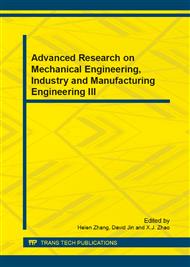[1]
P. Brucker, A. Gladky, H. Hoogevreen, M.Y. Kovalyov, C.N. Potts, T. Tautenhahn, S. Van deVelde: Scheduling a batching machine. Journal of Scheduling, Vol. 1(1998), pp.31-54.
DOI: 10.1002/(sici)1099-1425(199806)1:1<31::aid-jos4>3.0.co;2-r
Google Scholar
[2]
L.L. Liu, C.T. Ng and T.C.E. Cheng: On the complexity of bi-criteria scheduling on a single batch processing machine. Journal of Scheduling, Vol. 13(2010), pp.629-638.
DOI: 10.1007/s10951-010-0180-2
Google Scholar
[3]
F. Jolai: Minimizing number of tardy jobs on a batch processing machine with incompatible job families. European Journal of Operational Research, Vol. 162(2005), pp.184-190.
DOI: 10.1016/j.ejor.2003.10.011
Google Scholar
[4]
S.V. Mehta and R. Uzsoy: Minimizing total tardiness on a batch processing machine with incompatible job families. IIE Transactions, Vol. 30(1998), pp.165-178.
DOI: 10.1080/07408179808966448
Google Scholar
[5]
I.C. Perez, J.W. Fowler and W.M. Carlyle: Minimizing total weighted tardiness on a single batch process machine with incompatible job families. Computers and Operations Research, Vol. 32(2005), pp.327-341.
DOI: 10.1016/s0305-0548(03)00239-9
Google Scholar
[6]
R. Uzsoy: Scheduling batch processing machines with incompatible job families. International Journal of Production Research, Vol. 33(1995), pp.2685-2708.
DOI: 10.1080/00207549508904839
Google Scholar
[7]
G.C. Zhang, X.Q. Cai and C.K. Wong: On-line algorithms for minimizing makespan on batch processing machines. Naval Research Logistics, Vol. 48(2001), pp.241-258.
DOI: 10.1002/nav.5
Google Scholar


